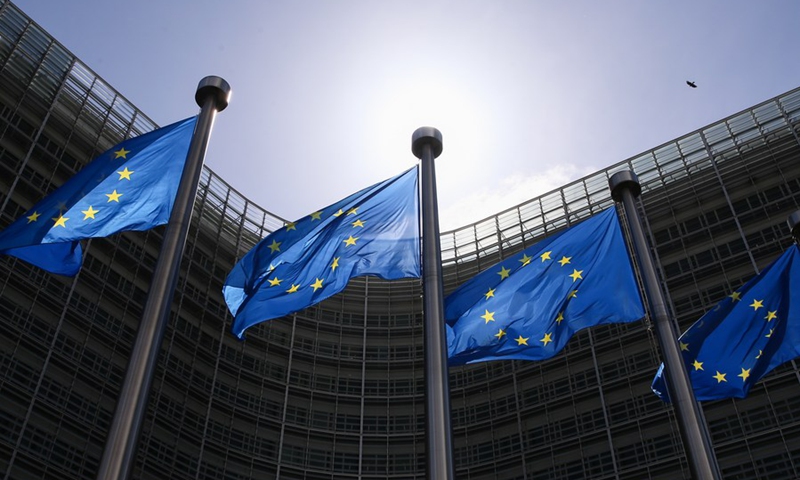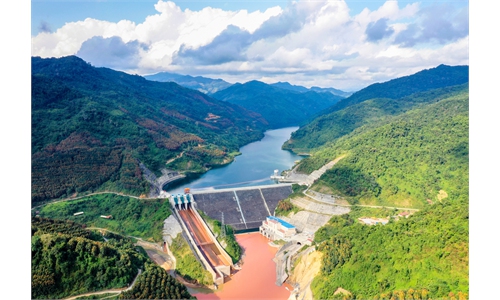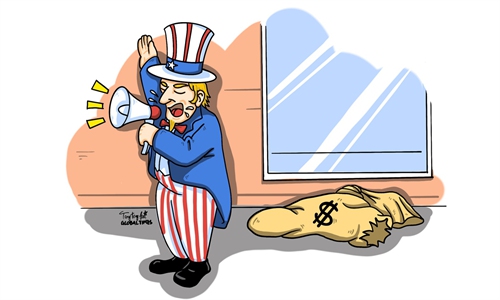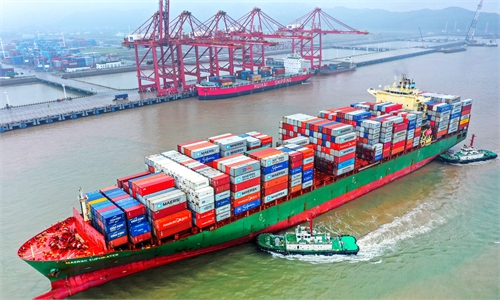
Flags of the European Union fly outside the EU headquarters in Brussels, Belgium, May 21, 2021. (Xinhua/Zheng Huansong)
The European Union (EU) on Wednesday announced plans to unveil the so-called Global Gateway, an infrastructure initiative to mobilize up to 300 billion euro ($341 billion) in public and private funds by 2027 to finance EU infrastructure projects abroad. Ever since it was first brought up in September, Western media outlets have widely described it as a bid to rival China's Belt and Road Initiative (BRI).
Although EU does not mention China in the document detailing its infrastructure push, European officials are straightforward when it comes to their political calculation behind the plan. German Ambassador to the EU Michael Clauss said the plan "has the potential to turn the EU into a more effective geopolitical player… offer of a rules-and-values-based cooperation at eye level will be an attractive alternative to the Chinese BRI."
As the COVID-19 pandemic is taking a toll on global economy, especially developing and underdeveloped countries, the plan appears beneficial for both EU and participating stakeholders. Yet, EU has put too much political calculations into the new infrastructure push. In the descriptions by EU officials and Western media, it is basically a geopolitical tool to promote ideology and boost influence.
Judging from the content of the plan referenced in media reports, this economic investment plan focuses on the output of ideology and values, rather than specific implementation plans.
Draft document shows that the 300-billion-euro plan is actually a collection of existing European initiatives and their overseas projects, and will emphasize values such as democracy and human rights during the implementation of the projects. With such a strong political underpinning, even if EU will really launch investments and start projects, it's hard to imagine how involved parties will respond to the political strings attached.
Attaching political conditions is the old problem of European aid to developing countries, and it is also the reason for its failure. European aid in developing countries in the past often came with ideology attached. Politics-oriented aid not only fails to promote local economic development, but also disrupts local politics and society due to too much political interference.
In addition, European aid to developing countries is predatory, rather than genuinely assisting local economic development. A large part of Europe's economic success today was built on the basis of plundering Asia and Africa. In recent years, with the emergence of economic problems in Europe, they have reduced their aid to developing countries. Even before the COVID-19 broke out, European aid to Africa had already begun to decline. The EU's aid to the least developed countries (LDCs) dropped by 9.1 percent in 2019, data from the OECD Development Assistance Committee (DAC) revealed.
China's BRI is fundamentally different from Europe's overseas aid projects. The reason why China has been able to achieve great success in economic cooperation with developing countries is because China has never attached any political conditions to BRI partnerships. Even though Western countries have spared no effort to smear and attack China on topics such as "debt traps," they have failed to undermine the cooperation between China and partner countries.
Europe's current interconnection plan is clearly in attempt to replicate the success of the BRI. In fact, from an economic perspective, under the common goal of promoting local infrastructure and economic development, EU's infrastructure plan should dock with China's BRI. Even if there is a certain degree of competition between the two sides, it can completely avoid the competition from turning into confrontation. But if the EU really aims to rival the BRI with its new infrastructure plan, it is doomed to fail.



